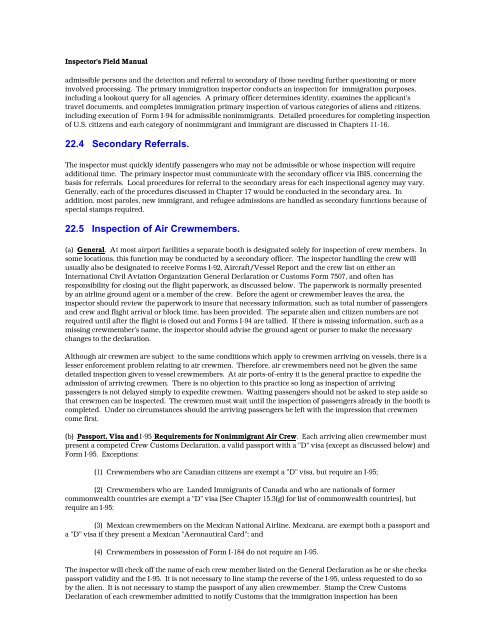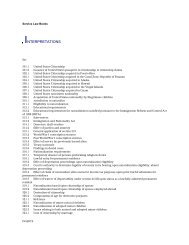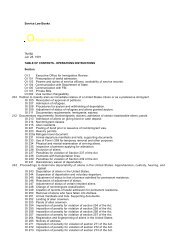You also want an ePaper? Increase the reach of your titles
YUMPU automatically turns print PDFs into web optimized ePapers that Google loves.
<strong>Inspector's</strong> <strong>Field</strong> <strong>Manual</strong><br />
admissible persons and the detection and referral to secondary of those needing further questioning or more<br />
involved processing. The primary immigration inspector conducts an inspection for immigration purposes,<br />
including a lookout query for all agencies. A primary officer determines identity, examines the applicant's<br />
travel documents, and completes immigration primary inspection of various categories of aliens and citizens,<br />
including execution of Form I-94 for admissible nonimmigrants. Detailed procedures for completing inspection<br />
of U.S. citizens and each category of nonimmigrant and immigrant are discussed in Chapters 11-16.<br />
22.4 Secondary Referrals.<br />
The inspector must quickly identify passengers who may not be admissible or whose inspection will require<br />
additional time. The primary inspector must communicate with the secondary officer via IBIS, concerning the<br />
basis for referrals. Local procedures for referral to the secondary areas for each inspectional agency may vary.<br />
Generally, each of the procedures discussed in Chapter 17 would be conducted in the secondary area. In<br />
addition, most paroles, new immigrant, and refugee admissions are handled as secondary functions because of<br />
special stamps required.<br />
22.5 Inspection of Air Crewmembers.<br />
(a) General. At most airport facilities a separate booth is designated solely for inspection of crew members. In<br />
some locations, this function may be conducted by a secondary officer. The inspector handling the crew will<br />
usually also be designated to receive Forms I-92, Aircraft/Vessel Report and the crew list on either an<br />
International Civil Aviation Organization General Declaration or Customs Form 7507, and often has<br />
responsibility for closing out the flight paperwork, as discussed below. The paperwork is normally presented<br />
by an airline ground agent or a member of the crew. Before the agent or crewmember leaves the area, the<br />
inspector should review the paperwork to insure that necessary information, such as total number of passengers<br />
and crew and flight arrival or block time, has been provided. The separate alien and citizen numbers are not<br />
required until after the flight is closed out and Forms I-94 are tallied. If there is missing information, such as a<br />
missing crewmember's name, the inspector should advise the ground agent or purser to make the necessary<br />
changes to the declaration.<br />
Although air crewmen are subject to the same conditions which apply to crewmen arriving on vessels, there is a<br />
lesser enforcement problem relating to air crewmen. Therefore, air crewmembers need not be given the same<br />
detailed inspection given to vessel crewmembers. At air ports-of-entry it is the general practice to expedite the<br />
admission of arriving crewmen. There is no objection to this practice so long as inspection of arriving<br />
passengers is not delayed simply to expedite crewmen. Waiting passengers should not be asked to step aside so<br />
that crewmen can be inspected. The crewmen must wait until the inspection of passengers already in the booth is<br />
completed. Under no circumstances should the arriving passengers be left with the impression that crewmen<br />
come first.<br />
(b) Passport, Visa and I-95 Requirements for Nonimmigrant Air Crew. Each arriving alien crewmember must<br />
present a competed Crew Customs Declaration, a valid passport with a "D" visa (except as discussed below) and<br />
Form I-95. Exceptions:<br />
(1) Crewmembers who are Canadian citizens are exempt a "D" visa, but require an I-95;<br />
(2) Crewmembers who are Landed Immigrants of Canada and who are nationals of former<br />
commonwealth countries are exempt a "D" visa [See Chapter 15.3(g) for list of commonwealth countries], but<br />
require an I-95;<br />
(3) Mexican crewmembers on the Mexican National Airline, Mexicana, are exempt both a passport and<br />
a "D" visa if they present a Mexican "Aeronautical Card"; and<br />
(4) Crewmembers in possession of Form I-184 do not require an I-95.<br />
The inspector will check off the name of each crew member listed on the General Declaration as he or she checks<br />
passport validity and the I-95. It is not necessary to line stamp the reverse of the I-95, unless requested to do so<br />
by the alien. It is not necessary to stamp the passport of any alien crewmember. Stamp the Crew Customs<br />
Declaration of each crewmember admitted to notify Customs that the immigration inspection has been




